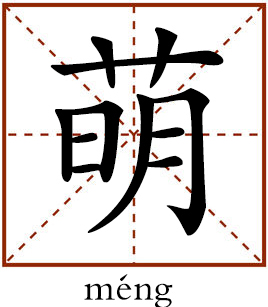Cute

This character originally refers to a bud. When used as a verb, it means "to sprout, begin or start." Influenced by Japanese culture, this character is often used to describe someone or something cute.
智者见于未萌
zhì zhě jiàn yú wèi méng
Zhi zhe refers to the wise. Jian means "to see" or "to know." Wei means "not yet" and meng "to appear, begin or sprout." This term literally means that a wise person sees or knows what will happen in the future. It signifies a man of foresight.
This term is derived from Shang Jun Shu (Book of Lord Shang), an ancient Chinese text attributed to the renowned legalist scholar Shang Yang (c. 390–338 BCE). In China, the talent of foresight has been highly valued since ancient times, evidenced by many household tales. A famous story of the renowned Chinese physician Bianque tells that when Bianque visited Duke Huan of the Cai state, he said that Duke Huan had a disease, which was dermatological, and could be cured. The duke brushed this aside as he felt no symptoms, and told his attendants that Bianque was just trying to profit from the fears of others. The duke was said to have died soon after.
Another legend says that during the Spring and Autumn Period (770–476 BCE), with the help of chancellor Guan Zhong, Duke Huan of Qi built the state of Qi into the most powerful one in China. Because of this, Duke Huan became the first of the Five Hegemons. There were four powerful officials serving in the Qi court. Shortly before his death, Guan Zhong advised that these officials should be sent into exile, because he believed that these four people were not loyal to Duke Huan. Duke Huan did so, but after the death of Guan, he found himself missing their particular talents at court and allowed these four people to return. They then conspired against him, and locked him in his room, secretly starving him to death. This is another example of why seeing or knowing a potential crisis is viewed as an important ruling ability.
The most severe threat to the survival and development of a country, a society, or an organization, usually is not a sudden disaster or accident, but lax and sluggish governance that has accumulated day by day, and only highly competent rulers can detect this type of threat.
Edited by REN GUANHONG
